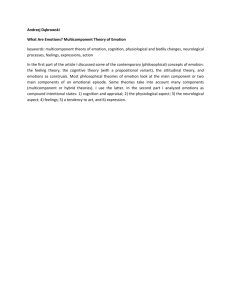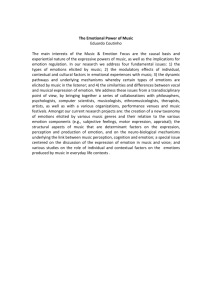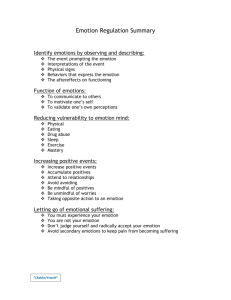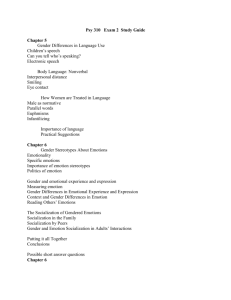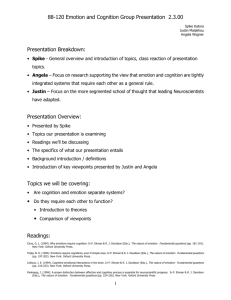Emotions - s3.amazonaws.com
advertisement
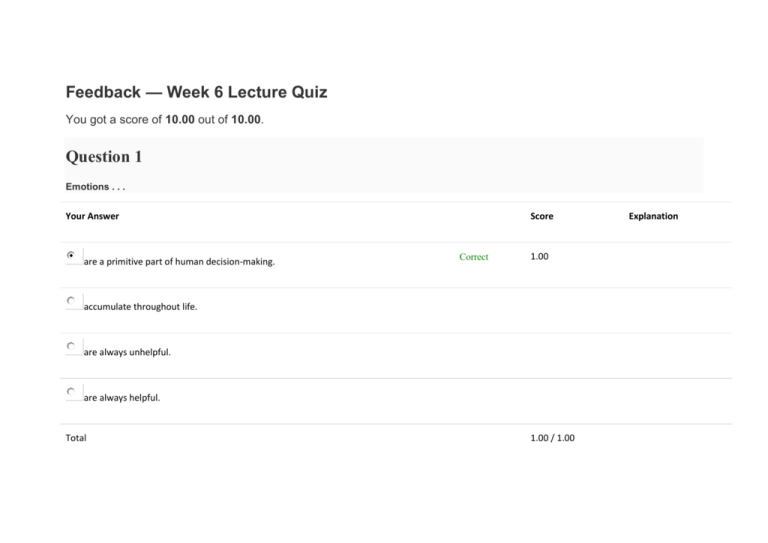
Feedback — Week 6 Lecture Quiz You got a score of 10.00 out of 10.00. Question 1 Emotions . . . Your Answer are a primitive part of human decision-making. Score Correct 1.00 accumulate throughout life. are always unhelpful. are always helpful. Total 1.00 / 1.00 Explanation Question 2 What does adaptation have to do with emotion? Your Answer Score Explanation Emotion cancels out adaptation. We adapt by returning to our usual emotional state, even after big changes to our situations. Correct 1.00 Adaptation is for animals and protists, and emotion is for human beings. Adaptation and emotion battle each other for our attention. Total 1.00 / 1.00 Question 3 In the study where men took a survey while self-stimulating, did participants correctly predict how they would be willing to behave when they were aroused? Your Answer Score We don’t know. They did not respond to the survey. Not entirely. The men predicted that they would be interested in a wider range of sexual acts and that they would take more risks, but they did not think they would be more willing to act immorally. The sophisticated men correctly predicted their willingness, but the naïve ones did not. No. The men did not realize how arousal would affect them, and underestimated the extent to which they would enjoy a variety of sexual acts or approve of risky and immoral acts. Total Question 4 What’s the problem with planning while in a cold state for how you would behave in a hot state? Correct 1.00 1.00 / 1.00 Explanation Your Answer Score Explanation You will not be able to communicate well while in a hot state. You will be much stronger when you’re in a hot state, so you have to be very careful not to abuse that strength. In a cold state, it’s hard to plan for this. Hot states like Texas or Arizona have more pleasant winters than cold states like North Dakota or Minnesota, but people forget how unpleasant the summers can be in a hot state. People tend to make inaccurate predictions about how hot states will influence their behavior, if they predict their behavior when they are in a cold state. Total Correct 1.00 1.00 / 1.00 Question 5 Why might it be better to ask people for donations to charities that fight global hunger before they eat a meal, when they’re hungry, rather than after they have eaten? Your Answer Score Explanation People tend to be more charitable in general when they are hungry. The earlier you ask people for donations, the more likely they are to have empathy for the beneficiaries. After people have eaten, they are in a hot state and find it very difficult to concentrate. When hungry, people will feel more empathy for others in a similar state and may be more likely to donate. Total Correct 1.00 1.00 / 1.00 Question 6 When is it preferable to base purchasing decisions on emotion rather than on cognitive analysis? Your Answer Score Explanation When the decision is very minor and will only happen once—for example, with choosing an ice cream flavor. When your experience with that purchase will be infrequent—for example, with an insurance policy. When your experience with that purchase will always be disorienting—for example, with investing in stocks. When greater empathy leads to pro-social behavior—for example, with helping others in need. Total Correct 1.00 1.00 / 1.00 Question 7 How do emotions affect risk assessments? Your Answer Emotions make us underestimate the risk of salient causes of death, particularly when these causes have been recently reported in the news. Score Explanation Emotions get us to rationally calculate the base rate of various risks and plan for them accordingly. People overestimate the risk of events that they feel to be out of their control. Correct 1.00 Emotions convince us that we are immortal. Total 1.00 / 1.00 Question 8 Which of the following best describes the relationship between emotion and cognition? Your Answer Cognition works much faster than emotion as a decision-making mode. Emotion is from Mars, and cognition is from Venus. Score Explanation Emotion describes why we think one option is better than another, and cognition describes how. Emotion and cognition can push us to make very different decisions. Correct Total 1.00 1.00 / 1.00 Question 9 What mistake do people systematically make about affective forecasting? Your Answer In contrast to what people predict about their future emotions, their emotions level off rather quickly in new situations People are too optimistic in their affective forecasting. The misery from negative life events and the happiness from positive life events stay with us much longer than we expect. Meteorologists can predict the weather and future emotional states. Score Correct 1.00 Explanation People think that both positive and negative forecasts will not have much of an affect. Total 1.00 / 1.00 Question 10 In the trolley problem, why are people willing to pull a lever to sacrifice one person in the first scenario but not willing to push the guy with the backpack off the bridge in the second scenario? Your Answer The first scenario triggers calculated reasoning, whereas the second scenario triggers a fight-or-flight response. Ivan Pavlov conditioned people to pull levers, and people can’t resist the urge when they hear the sound of the train approaching. They have not been conditioned to push people off bridges. In the second scenario, people tend to calculate the difference between four and one, and decide that they would only push someone off a bridge if it would save ten or more people. Score Explanation Decisions in the first scenario are based on calculated reasoning, but decisions in the second scenario are based on emotion. Total Correct 1.00 1.00 / 1.00


